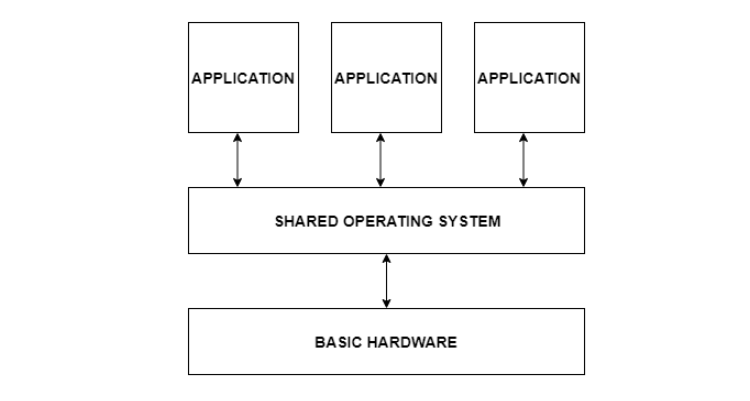
 Data Structure
Data Structure Networking
Networking RDBMS
RDBMS Operating System
Operating System Java
Java MS Excel
MS Excel iOS
iOS HTML
HTML CSS
CSS Android
Android Python
Python C Programming
C Programming C++
C++ C#
C# MongoDB
MongoDB MySQL
MySQL Javascript
Javascript PHP
PHP
- Selected Reading
- UPSC IAS Exams Notes
- Developer's Best Practices
- Questions and Answers
- Effective Resume Writing
- HR Interview Questions
- Computer Glossary
- Who is Who
What is Virtualization?
Virtualization in operating system changes a normal operating system so that it can run different types of applications that may be handled on a single computer system by many users. The operating system may appear different to each user and each of them may believe they are interacting with the only operating system i.e. this does not interfere with user experience.
Operating system virtualization can also be used to migrate a process from one instance of the operating system to another. However, all the processes in the system are isolated and there operations are strictly monitored so there are no discrepancies in the system.
A diagram representing operating system virtualization is as follows −
Advantages of Virtualization
Some of the advantages of virtualization are −
- Virtualization allows a finite number of hardware resources to be easily distributed to multiple processes that require them.
- Improved security can be obtained by using virtualisation. This happens because each process inhabits its own instance of the operating system and works independently.
- Operating system virtualization is very useful for establishing a virtual hosting environment.
- There is only a little overhead involved for operating system virtualization and so it is very beneficial.
Disadvantages of Virtualization
Some of the disadvantages of virtualization are −
- Specialized experts are required to implement and manage a virtualized system. This results in need for virtualization experts and increased costs.
- There are many upfront costs involved in virtualization. These include the cost for virtualization software as well as the additional hardware required. The costs also depends on the existing system network.
Despite some problems, virtualization is quite useful. It has numerous advantages and its disadvantages are merely simple challenges that can be overcome with the help of experts in operating system virtualization.


